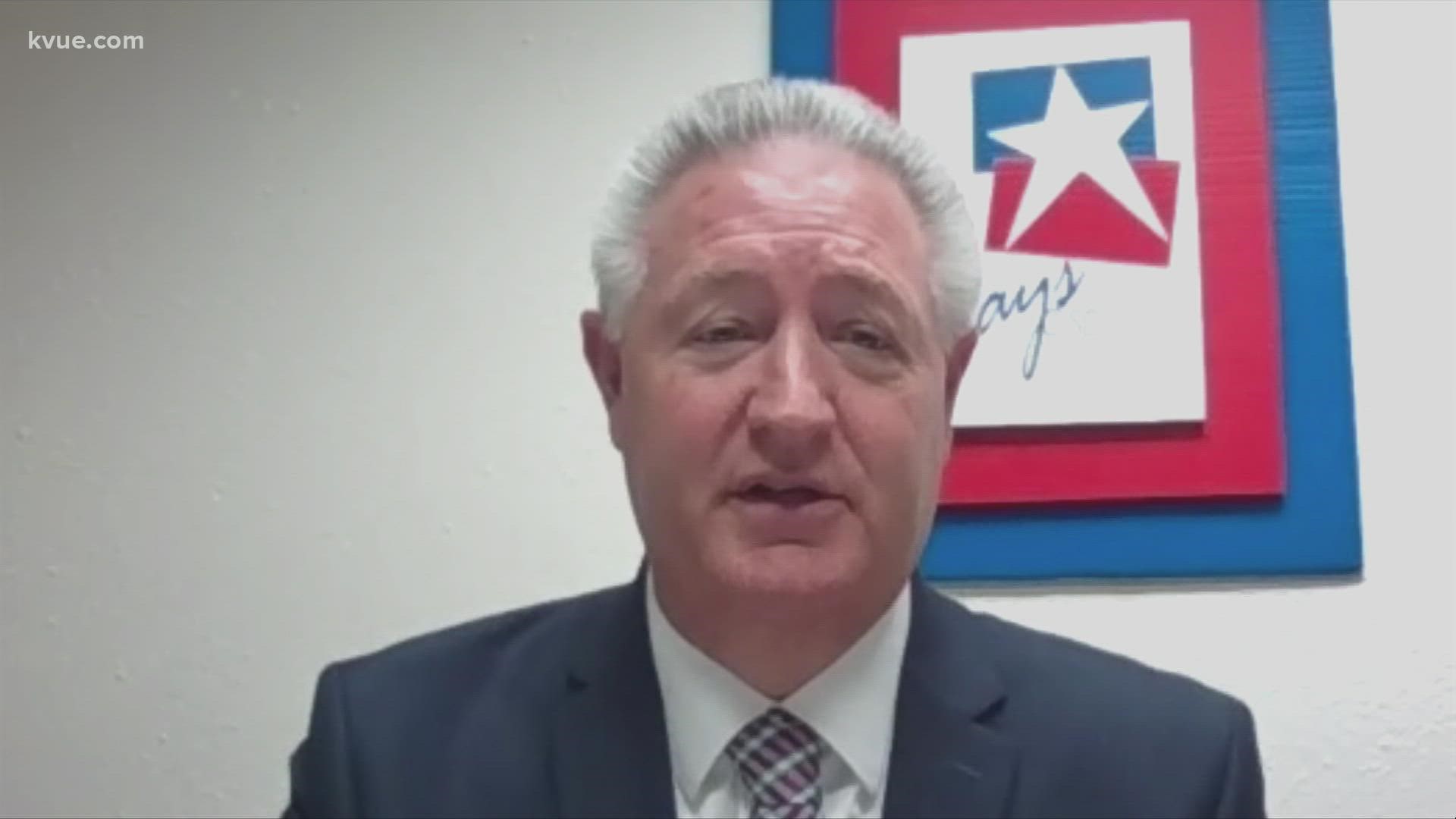HAYS COUNTY, Texas — The new school year is just around the corner for Central Texas school districts, including Hays CISD. And as COVID-19 cases and hospitalizations spike all across Texas, many are wondering what protections are in place for children in the classroom.
KVUE asked Hays CISD parents to send in their questions for Superintendent Dr. Eric Wright to answer.
We're starting to see some districts defy the State's orders [about mask mandates] and make it a requirement. One parent wants to know: Will you be joining in with other ISDs and requiring them anyway for the sake of your students? Why or why not?
Wright: "So we are going to highly encourage and urge our students and our staff and our community to wear masks. We are not, at this point, going to recommend defying the governor's order because it is the law. And I think it would be really disingenuous to say that we were going to have a mask mandate and then not be able to have the power to enforce it because it is, it is the law. And if I say that we're going to mandate it, then people would expect that everybody inside our building would be wearing a mask.
And say I have a group of third-graders that choose not to wear their masks that day, and who am I going to call? Law enforcement? And they're going to come out and say, 'The governor created this law and you are the one that asked me to break the law.' So, I just don't think that would be wise because we do not have the ability to enforce that. And I understand why other people are doing it, they're trying to get the governor to take notice and to, and to change the law. But I think there are other ways to do that. And I think we would have a trickle-down effect if we just told people that, 'If you don't like this law or this law or this rule, then you don't have to follow.' I think that leads to anarchy."
One parent asked: "Why isn't Hays CISD offering a real virtual learning option this year like so many of the other school districts are? The only option offered in Hays is the Homebound Academy, which requires a medical note from a doctor, which can cost parents some money for the appointment. Also, if they're uninsured, that can also create some hardships. And [it] has the student doing asynchronous work with only access to a teacher if they have an urgent question. So, how is this an equivalent alternative to the virtual learning offered last year? Could you utilize the emergency funds perhaps received from the government to fund a real virtual learning program?"
Wright: "I would say that our Homebound Academy is our real virtual option, and we are using our ESSER funds to help stand that up. And it will be as little as one hour a day based on the child's underlying medical condition, and it could be up to four hours of synchronous learning a day according to what is best for the child and right for why they're there.
We wanted to go this route because other districts we've found have had to limit their seats and by going through this methodology, we do not have to limit our seats. So, if we do have a medically fragile child or a child that doesn't need to be in school in person, then this is what we feel is the better option. We really want to have all of our students back in person because we feel like that is the best way for them to learn. As far as mental health and social-emotional learning and just the quality of instruction, we feel is much superior in person."
Since most students will come back on campus, what other measures besides masks will be in place to keep COVID-19 at bay in the classroom?
Wright: "So, we are going to try and follow all of the CDC guidelines that we followed last year at the same time. And I know I have people on both sides, some that don't want to wear masks, some that don't have any restrictions and others that want to basically go back to the way it was last year. But we've progressed a lot because the majority of our staff has been vaccinated. And so, we're going to do the same things we did. We're going to try to spatial distance where we can, follow the American Academy of Pediatrics guidelines. We're going to still utilize the hand sanitizer, and we're going to have our custodial staff and our transportation staff fumigate frequently. And we're going to make sure that we follow those protocols. We will have water bottle filling stations instead of using the water fountains, and we'll try to spread the kids out as much as possible."
If there is a COVID-19 case, what is the district's strategy for mitigating the spread? We know that the Texas Education Agency says districts didn't have to notify parents or conduct contact tracing. But do you plan to still notify the parents anyway?
Wright: "Yes, we do, TEA is not following the CDC guidelines in that instance because I think they're kind of tied to the governor's order and so we kind of had to back off of that. But we are going to follow CDC guidelines and state health guidelines and we're going to do contact tracing. We're going to let parents know when, when their kids have been exposed to a COVID positive. We're going to continue to keep our dashboard and keep count so that we can be transparent and also so that we can make good decisions. Because as we move through this, if our cases lessen and the numbers decrease, the restrictions also can be decreased as well."
PEOPLE ARE ALSO READING:

